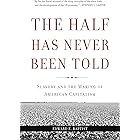| Digital List Price: | $30.00 |
| Kindle Price: | $11.27 Save $18.73 (62%) |
| Sold by: | Amazon.com Services LLC |
Your Memberships & Subscriptions

Download the free Kindle app and start reading Kindle books instantly on your smartphone, tablet, or computer - no Kindle device required.
Read instantly on your browser with Kindle for Web.
Using your mobile phone camera - scan the code below and download the Kindle app.

OK
 Audible sample Sample
Audible sample Sample 


They Were Her Property: White Women as Slave Owners in the American South Kindle Edition

Explore your book, then jump right back to where you left off with Page Flip.
View high quality images that let you zoom in to take a closer look.
Enjoy features only possible in digital – start reading right away, carry your library with you, adjust the font, create shareable notes and highlights, and more.
Discover additional details about the events, people, and places in your book, with Wikipedia integration.
Winner of the Los Angeles Times 2019 Book Prize in History
Winner of the Southern Association for Women's Historians 2020 Julia Cherry Spruill Prize for the best book in southern women's history
Winner of the Southern Historical Association 2020 Charles S. Sydnor Award for the best book in southern history published in an odd-numbered year
Winner of the Society for Historians of the Early American Republic 2020 Best Book Prize
Winner of the Organization of American Historians 2020 Merle Curti Social History Award for the best book in American social history A bold and searing investigation into the role of white women in the American slave economy
Bridging women's history, the history of the South, and African American history, this book makes a bold argument about the role of white women in American slavery. Historian Stephanie E. Jones-Rogers draws on a variety of sources to show that slave†'owning women were sophisticated economic actors who directly engaged in and benefited from the South's slave market. Because women typically inherited more slaves than land, enslaved people were often their primary source of wealth. Not only did white women often refuse to cede ownership of their slaves to their husbands, they employed management techniques that were as effective and brutal as those used by slave†'owning men. White women actively participated in the slave market, profited from it, and used it for economic and social empowerment. By examining the economically entangled lives of enslaved people and slave†'owning women, Jones-Rogers presents a narrative that forces us to rethink the economics and social conventions of slaveholding America.
- LanguageEnglish
- PublisherYale University Press
- Publication dateFebruary 19, 2019
- File size6987 KB
Customers who bought this item also bought
Editorial Reviews
Review
"Jones-Rogers has provided a brilliant, innovative analysis of American slavery, one that sets a new standard for scholarship on the subject."--Elizabeth R. Varon, The Washington Post
"Herein lies the greatest innovation of Jones-Rogers's book--to show that the power white women wielded over enslaved people, reflected in horrific violence, extended into the economic structures of slavery. They engaged in brutal acts with the logic of the market in mind. Hers is the first book to isolate white women as economic actors in the slave system, and thus the first to dismantle another long-standing myth about these women--that they simply stood by as men conducted the business of slavery."--Lynne Feeley, The Nation
"The full role of white women in slavery has long been one of the 'slave trade's best-kept secrets.' They Were Her Property, a taut and cogent corrective...examines how historians have misunderstood and misrepresented white women as reluctant actors...They Were Her Property draws on the customary sources--letters and other documents from slave-owning families and the like--but radically centers the testimonies of formerly enslaved people in interviews conducted by the Federal Writers' Project, part of the Works Progress Administration. From these stories, Jones-Rogers brings an unseen world to life...Jones-Rogers is a crisp and focused writer. She trains her gaze on the history and rarely considers slavery's reverberations. They are felt on every page, however. It is impossible to read her on 'maternal violence'--the abuse of black mothers and babies during slavery--without thinking of black maternal mortality rates today. This scrupulous history makes a vital contribution to our understanding of our past and present."--Parul Sehgal, The New York Times
"Compelling...Jones-Rogers captures the echoes of what happens when America's greatest atrocity -- and who participated in it -- is deliberately misunderstood and unchallenged."--Renee Graham, Boston Globe
"Stunning."--Rebecca Onion, Slate
"One of the most significant books on the history of women and slavery."--Edward E. Baptist, author of The Half Has Never Been Told: Slavery and the Making of American Capitalism
"This is a deeply researched and powerfully argued book that completely overturns romanticized notions of the plantation mistresses and resistant southern white women. Stephanie Jones-Rogers reveals how deeply complicit slaveholding white women were in upholding the everyday cruelties and barbarity of racial slavery."--Manisha Sinha, author of The Slave's Cause: A History of Abolition
"They Were Her Property casts brilliant, unsparing light on the history of slaveholding women and the terrible oscillation of domination and dependence that defined identities--as wives, as mothers, as mistresses--purchased in the slave market."--Walter Johnson, author of River of Dark Dreams
"Stephanie Jones-Rogers has written a highly original book that will change the way we think about women enslavers in the United States. A must-read for anyone interested in the history of gender, slavery and capitalism."--Daina Ramey Berry, author of The Price for Their Pound of Flesh: The Value of the Enslaved, from Womb to Grave, in the Building of a Nation
"They Were Her Property is nothing less than phenomenal. It shatters many sacred cows about women's history and legal history and shows how slaveowning women skirted the limitations of gender norms and statutory law in ways that have been previously underestimated. The findings are buttressed by reading anew a rich and prodigious body of primary sources. This is a must read."--Tera W. Hunter, author of Bound in Wedlock: Slave and Free Black Marriage in the Nineteenth Century
About the Author
Product details
- ASIN : B07N8T72TR
- Publisher : Yale University Press (February 19, 2019)
- Publication date : February 19, 2019
- Language : English
- File size : 6987 KB
- Text-to-Speech : Enabled
- Screen Reader : Supported
- Enhanced typesetting : Enabled
- X-Ray : Enabled
- Word Wise : Enabled
- Sticky notes : On Kindle Scribe
- Print length : 322 pages
- Best Sellers Rank: #370,218 in Kindle Store (See Top 100 in Kindle Store)
- #205 in History of Southern U.S.
- #285 in African American Studies
- #886 in History eBooks of Women
- Customer Reviews:
About the author

Stephanie E. Jones-Rogers is Associate Professor of History at the University of California, Berkeley.
Customer reviews
Customer Reviews, including Product Star Ratings help customers to learn more about the product and decide whether it is the right product for them.
To calculate the overall star rating and percentage breakdown by star, we don’t use a simple average. Instead, our system considers things like how recent a review is and if the reviewer bought the item on Amazon. It also analyzed reviews to verify trustworthiness.
Learn more how customers reviews work on AmazonReviews with images
-
Top reviews
Top reviews from the United States
There was a problem filtering reviews right now. Please try again later.
“Southern communities, lawmakers, and courts recognized slave-owning women as individuals able to acquire and exercise mastery over enslaved people, s is evident from laws passed throughout the South. Laws dating back to the colonial period routinely recognized the mistresses owned enslaved people in their own right, and these same laws acknowledged the fact that these women were capable of exercising mastery over the enslaved people they owned.” Stephanie E. Jones - Rogers.
They were referred to as Southern Belles’. Revered for their ladylike daintiness. But… there was nothing dainty about their dealings for they too, owned human property. These white southern mistresses were heavily involved and often owned more property than their male counterparts even being the breadwinners. These women were barbaric and wore the crown of cruelty.
Dr. Rogers gave the enslaved a voice in this text – allowing our ancestors to share with us their story and experiences under the thumb of white mistresses. This text uncovers the extent of the involvement that white women had with slave ownership. There was discord in marriages due to white women struggles to maintain control of their financial gains of human property. These women utilized the judicial system to protect their pecuniary interests. The parents of these white girls/women bequeathed slaves to white females i.e. as young as newborns – which leads us to mistresses in the making – that is the education of young white women of the mastery of slave ownership. My heart broke as I was able to envision the accounts of atrocities inflicted upon our ancestors. Our people were raped and forced into being breeders and wet nurses to ensure the livelihood of these white mistresses and their families. The evidence is insurmountable in all the ways slave-owning women invested in, and profited from their financial ties to American slavery and its marketplace. Most importantly, there was testimony from formerly enslaved people of their experiences within slavery. This text is a mandatory read for all and in my opinion, must be included as part of the curriculum in schools.
Jones-Rogers offers a well written account that is rich in historical details. She demonstrates through vivid historical evidence that the women that owned enslaved people were primarily driven by economic motives, and that these women were just as demanding and could be just as harsh as the "typical" slaveowner image that has been crafted over the years.
The book is organized thematically, and each chapter demonstrates the economic motivation behind slave ownership. The reader is offered views of everything from young children becoming slave owners when their parents "gifted" them an enslaved person, and how these young girls were taught that this was "property" that could be used as desired to how these female slaveholders would sell their slaves to meet their economic goals.
All told, this is a fascinating book that uncovers a long ignored slice of Antebellum American history that makes the historiographical literature of pre-Civil War history much richer.














